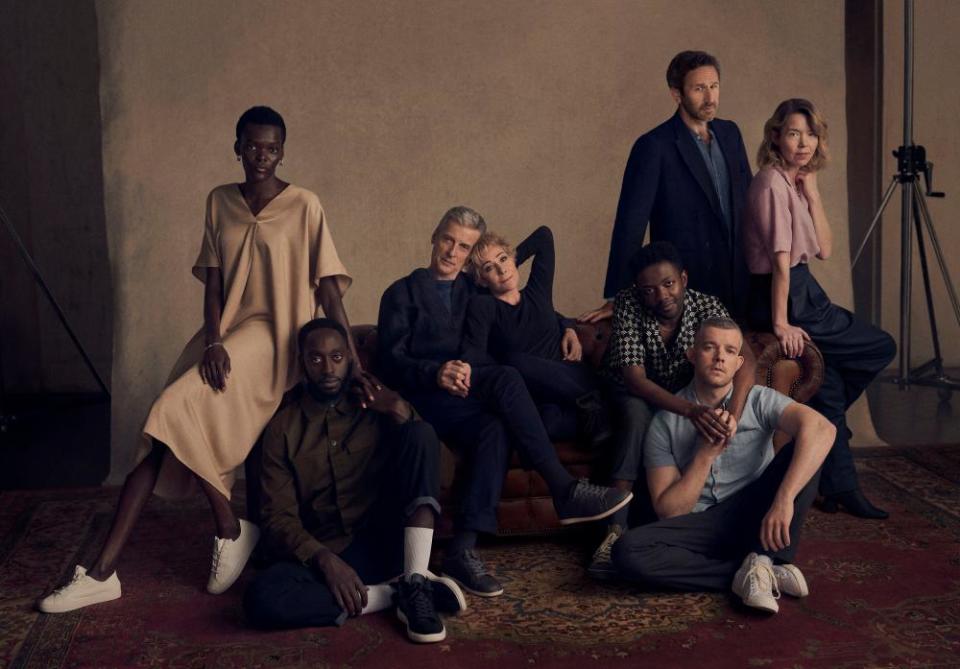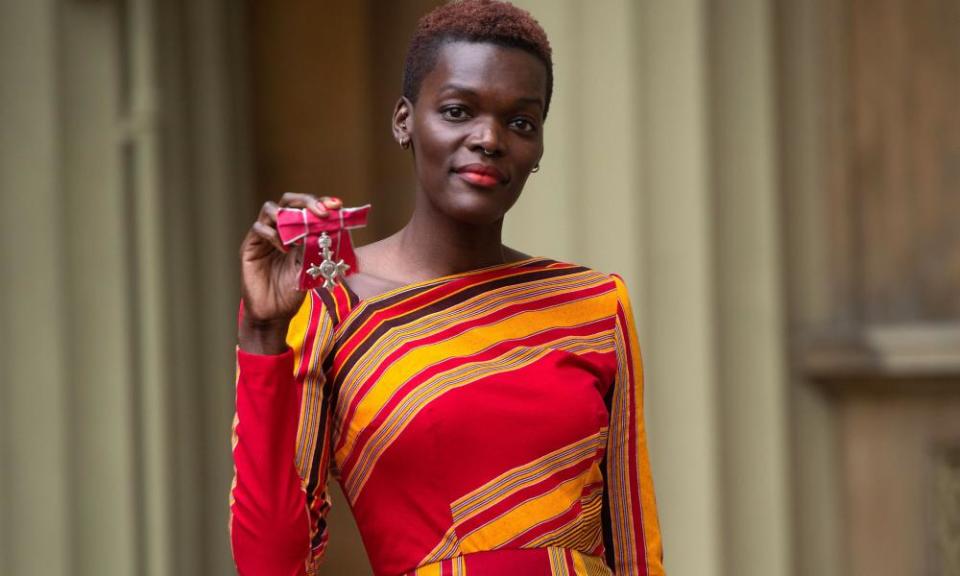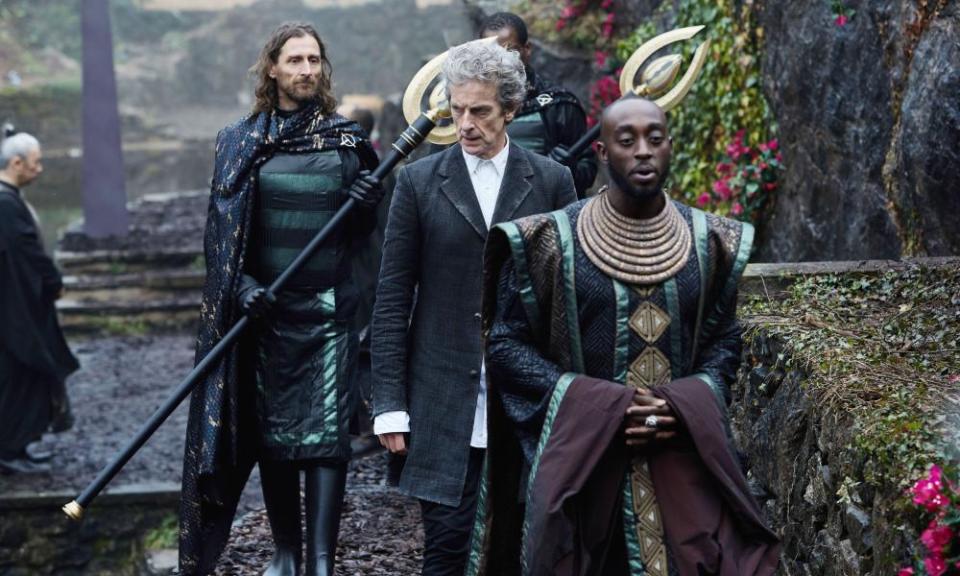Stars aligned: Sheila Atim and Ivanno Jeremiah on reviving a mind-bending classic

“In the quantum multiverse, every choice, every decision you’ve ever made and never made exists in an unimaginably vast ensemble of parallel universes.” So says quantum physicist Marianne in Nick Payne’s award-winning two-hander, Constellations. It follows that Sheila Atim, who plays Marianne in the latest revival of the play, may or may not have been bullied by her co-star Ivanno Jeremiah when they met at a party in real life as children. The encounter may, or may not, have happened at a big cook-up in south London, thrown in the early 00s by families of northern Ugandan Acholi heritage, which both actors share. Jeremiah was 11 or 12, Atim a couple of years younger. Twenty years on, the conversation goes like this:
Atim: “He picked on me. And it’s funny, because I remember the event really vividly, but I didn’t remember that it was him.”
Jeremiah: “Allegedly!”
Atim: “Listen, it’s true. You said I was posh.”
Jeremiah: “Yeah, right.” [Resigned laugh]
It wasn’t until Atim, yet to become a professional performer herself, told her mother about an Acholi actor she had met, after happening to see him in a show at the Royal Court, that her mum said, “You know that you’ve met him before?” and it all clicked into place.
A week into rehearsals for Constellations, Jeremiah and Atim make a striking couple – tall, elegant and sparking affectionately off each other over their lunch boxes. But their easy-going banter doesn’t conceal the fact that this show is a big deal for two young actors – not only because it’s the reopening show for the Donmar Warehouse and is being staged in the West End’s Vaudeville theatre, but because of the company they are keeping, and the comparisons this will inevitably invite. Director Michael Longhurst has no doubts. He spotted Jeremiah through shows including Danai Gurira’s Zimbabwean epic The Convert at the Young Vic, and Atim through her Olivier award-winning performance in the musical Girl from the North Country. “They are both just superstars, and their chemistry is amazing,” he says. “Ivanno is so soulful and can switch in an instant to being very funny, and Sheila is just so dextrous. The speed of thought she brings to it is extraordinary.”

Over the past nine years, Constellations has been staged in London, New York and numerous other cities around the world, becoming something of a theatre classic. Reviewing its Royal Court premiere, starring Rafe Spall and Sally Hawkins, in 2012, New Yorker critic John Lahr noted it as “a singular astonishment… at once eloquent and mysterious but which nonetheless articulates within its own idiosyncratic idiom something that touches an audience as real.” In this all-star revival, Atim and Jeremiah are the first of four couples who will be performing it over a four-month period: Zoë Wanamaker and Peter Capaldi will take it up in age, Anna Maxwell Martin and Chris O’Dowd will perform a fortysomething, white version, and Omari Douglas and Russell Tovey will play it gay.
“I’m really buzzing about it, because I’m a huge fan of everyone on the billing,” says Atim, who turns full-on fangirl when she recalls the moment when it first hit her that she would be sharing that billing with Capaldi. “I’m not going to lie, I was like: ‘Oh my God, we’re in a thing together,’ because I love Peter’s work. The Thick of It is one of my top three shows, I watch it all the time, and I’ve watched Zoë for years. I used to be obsessed with [the TV sitcom] My Family when I was young.” Jeremiah can trump that: he played the villain in an episode of Doctor Who when Capaldi was the Doctor. “He takes pictures whenever he’s on set, and he actually had a picture of me…”
I’m really proud that they’re the opening couple, because it makes such a strong statement about the story of black love
There’s a Whovian moment when we consider how many permutations the multiple casting of Constellations will generate, given the play itself is a love story constructed as multiple repetitions of scenes whose meaning and outcome sometimes revolve on the change of a single word. The answer brings Atim and Jeremiah to a point of agreement: it can only be infinity, times four.
The fact that these up-and-coming actors have been chosen to open the show has everything to do with the complicated moment at which we find ourselves, when Black Lives Matter and the Covid pandemic have merged into a collective cry of pain and injustice, demanding fresh creative responses. “I’m really proud of the fact that they’re the opening couple, because it makes such a strong statement about the story of black love,” says Longhurst. Both are among a new generation of black British actors who are becoming international players. Atim is currently on screen as Cora’s runaway mother in Barry Jenkins’s high-profile TV adaptation of Colson Whitehead’s The Underground Railroad (she’s a haunting, charismatic presence, for all that you have to wait until the last episode to see her). In 2019, Jeremiah starred as a gentle and generous Eritrean refugee in The Flood, a quietly powerful film about the migrant crisis.
Though it’s a lucky actor who has maintained any presence at all over the past year, it might all have been so much starrier if Bloodmoon – the much-trumpeted prequel to George RR Martin’s Game of Thrones, scripted by Jane Goldman – hadn’t been unexpectedly junked. The two actors spent part of 2019 filming a pilot episode in Belfast. Why was it scrapped? “We’ll never know,” says Atim. Asked what sort of roles they were playing, she draws a big zip across her mouth – non-disclosure contracts are one thing in the universe whose meaning never changes.

Jeremiah, who has form in sci-fi and fantasy that extends beyond Doctor Who to Charlie Brooker’s Black Mirror and the recurring part of Max in Channel 4’s Humans, is a bit more forthcoming. “They were writing some amazing things from groundbreaking concepts. And for that to be in such a big vehicle… I think it could have done a great deal for conversations that are happening this year,” he says. But though it was a disappointment, they agree that it wasn’t a waste of time. “The scale of the production was something that I hadn’t experienced before, and I got to meet lots of people. So as a self-contained experience I look back on it very fondly,” says Atim.
Bloodmoon would have been the first time the actors had actually appeared together, though they have followed each other’s careers since their penny-dropping encounter at the Royal Court’s Jerwood theatre in 2011, where Jeremiah was making his professional debut in the cast of debbie tucker green’s Truth and Reconciliation.
For all that they both arrived in the UK as babies, from the same part of Uganda, their careers have converged from different directions. Jeremiah was just one month old when his mother landed in south London with five small children. He moved from a south London comprehensive to the Brit School for performing arts in his early teens, abandoning the idea of signing up for a law degree when he was accepted into multiple drama schools. He chose Rada, and his feet have barely touched the ground since.
Atim was an only child, brought up in Essex by a mother who rose to become a managing commissioner for the NHS. At school she sang, acted, played four instruments, and was signed up by a modelling agency, but was set on becoming a doctor until she failed to get a place at medical school. Although she went on to do a degree in biomedical sciences at King’s College London – and says she’s determined one day to take her scientific studies further – she decided then and there that she was going to be some sort of performer, saying: “It was like a bubble popped over my head.”

While Jeremiah took the blue-chip route, touring Shakespeare with the RSC, followed by an international run in The Suit, directed by the great Peter Brook, Atim initially set her sights on a singing career. With the blessing of her tutor, she combined her degree with open-mic nights and music classes at north London’s WAC performing arts school. “I was really close to not finishing that degree, because I was so ready to get out of institutionalised education, but I loved the science and had a loan, and he said: ‘I know you’re really into this artistic stuff, but you’ve just got to finish this. You may get more out of it than most people on the degree, even though you’re not going to pursue it.’ And I think he was right.”
Gradually, she gravitated from singing towards acting and, just three weeks after sitting her finals, she started rehearsals at the Globe for a musical adaptation of Euripides’s The Bacchae (written by her WAC acting teacher, Ché Walker, for whom she would later compose the score for a play). Within three years she was making a name for herself with a non-speaking role in Les Blancs at the National, followed by Phyllida Lloyd’s all-female Shakespeare trilogy, set in a women’s prison. As a “glorious, giddy” Ferdinand in The Tempest and a “moving” Lady Percy in Henry IV, according to one critic, she “frequently seems to be physically stabbing the text as much as speaking it”.
It was in a later Shakespeare production – playing Emilia to Mark Rylance’s Iago in Othello at the Globe in 2018 – that she caught the attention of The Underground Railroad director Barry Jenkins. That same year, she won an Olivier for her role as a pregnant teenager in the Bob Dylan-inspired musical Girl from the North Country, and in December 2019 – aged just 28 – she was awarded an MBE.
Mention of The Underground Railroad and Jenkins turns her back into a fangirl. “As an artist, his vision is truly fresh and detailed and considered and passionate,” she says. “But he’s also just a great guy who runs his sets and his projects so thoughtfully. Everyone wants to make him happy for the best possible reason.” She went straight on to a role opposite Halle Berry in Berry’s directorial debut, Bruised: “Just a beautiful woman taking a big leap. So that was also incredibly inspiring.”

Within weeks of going to Buckingham Palace to receive her MBE from Prince William, the pandemic had kicked in. How did it feel to screech to such a sudden halt? It’s been a time of reflection, she says, “trying to figure out lots of different ways in which it can be utilised, as opposed to just automatically assuming that, because I’ve stopped as an artist, I must fill that space with art. I did do creative things during lockdown, but I also did relaxing things and mundane things and very necessary things.” Such as? “Like laundry,” she fires back. “I’ve never had time to do laundry thoughtfully before, rather than just leaving my clothes on the side because I didn’t have the time to hang them up.”
This year was a good opportunity to pause and consider what I am as an artist, without that fix of immediate feedback
Jeremiah also went into a period of decompression after having five projects on the go towards the end of 2019. “If you encompass everything, including lockdown and Black Lives Matter, it’s been intense. So much of that time has been about holding a mirror up to the self. Really illuminating myself to myself. I’ve been working for 10 years now, and it was quite a good opportunity to pause and be forced to consider what I am as an artist without that fix of immediate feedback.”
They both approach the Black Lives Matter protests with some caution. For all the supposed previous leaps forward, Halle Berry is still the only black woman to be awarded an Oscar for best actress, and she won it nearly 20 years ago, points out Atim. “Whatever kind of change you’re trying to achieve, whether it’s for black people or for women, or disabled or trans people, it’s just a long process, and there are stages to it. There’s the outpouring of emotion, and then there’s trying to rationalise that emotion in order to make change. But there’s also the healing that has to happen, the education, the introduction of new ways of doing things, and then ensuring that those introductions are sustainable...”

Both have spent part of the past year writing. Jeremiah had a poem published as part of a lockdown anthology of work by actors, including Harriet Walter, Simon Callow and Tom Hollander. Atim, meanwhile, spent the early part of the year reworking a play that she wrote for the Edinburgh fringe in 2019. Anguis involved a virologist conducting Desert Island Discs-style interviews with overlooked women in science – including Cleopatra, who, we learn, backed research into the curative properties of sour donkey milk and crocodile. “There’s a virus outbreak in the storyline, and there were already the rumblings of this pandemic coming. It was a very surreal experience, because a lot of the things I was trying to talk about in the play were coming to pass,” says Atim.
Inevitably, she found that Anguis had come out of the crisis a different play, and she’s sure those who have already seen Constellations will find the same is true of that, too. “It’s about alternatives. And it’s about choices. There are so many moments over the last year where people have wanted choice, and not been able to have it, because of lockdowns and restrictions, or have lost people, and have entertained a parallel world where that person could still be here,” says Atim.
“That’s it, yeah,” chimes in Jeremiah. “And it speaks about connection after such a long period of disconnection. Coming out of this period, we really have to get in touch with our autonomy again, and say, ‘My life really is my own. And I can actually choose lots of things within it and make decisions.’ There’s a sad element to the story, and there’s a hopeful side as well, when you think about the future, and what’s possible. In the end, you know, it’s still about love.”
Our hour is up, and they are being chivvied back into rehearsal. “Just for the record, I never bullied Sheila,” quips Jeremiah, as we set off for our different realities. Who, in this mind-bending universe of ours, can be certain that he’s wrong?
• Constellations is at the Vaudeville theatre, 18 June-12 September (Sheila Atim and Ivanno Jeremiah from 18 June-1 August)

